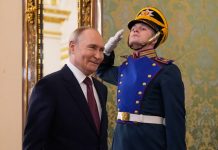Many netizens have hailed Turkish President Erdogan for criticising India and Israel over Kashmir and Palestine at UNGA but many have also rebuked Ankara for conveniently missing out on the plight of Uighur Muslims.
The Uyghur Muslims are predominantly Turkic-speaking ethnic group from China’s Xinjiang province have been subject to religious and ethnic persecution by the Chinese communist government.
According to a Washington Post report, up to 1.1 million people, or 11.5% of the Uighur population between the ages of 20 and 79, are believed to be held in “concentration camps” where they are allegedly forced to renounce their religion and Uighur language and memorise and recite Chinese characters and propaganda songs.
Many Uighurs have historically seen Turkey as a champion for their rights and a place of refuge from the Chinese rule, however, the story has completely changed ever since ties have grown between China and Turkey.
Kashmir Happy?

Meanwhile, Ghulam Nabi Fai, secretary-general of the US-based World Kashmir Awareness Forum says – the people of the State of Jammu and Kashmir have no words to express their heartfelt thanks to President Recep Tayyip Erdogan, the President of the Republic of Turkey, for reiterating one more time his Administrations support for the just cause of Kashmir.
His words on Tuesday at the 75th session of the UN General Assembly have become a source of inspiration and given hope to millions of hopeless people of the region. His statement at the General Assembly was the true reflection of the aspirations of the people of Kashmir.
His reference to Kashmir is a statement of facts when he said: “The Kashmir conflict, which is also key to the stability and peace of South Asia, is still a burning issue. Steps that were taken following the abolition of the special status of Jammu – Kashmir further complicated the problem.
We are in favor of solving this issue through dialogue, within the framework of the UN resolutions and especially in line with the expectations of the people of Kashmir.”
President Erdogan’s statement today is consistent with his statement, which he made in May 2017 during an interview with WION television channel: “We should not allow more casualties to occur, and by strengthening multilateral dialogue, we can be involved, and through multilateral dialogue, I think we have to seek out ways to settle this question (Kashmir) once and for all.”
Erdogan’s mention here for multilateral dialogue is also consistent with the statement made by the president of the UN General Assembly, Ambassador Volkan Bozkir who also happened to be a Turkish diplomat, who said: “Multilateralism is not an option, but a necessity.”
Bilateralism has indeed failed in resolving the Kashmir conflict. The mantra has been repeated by some world powers that they have no alternative but to rely on bilateral talks between India and Pakistan to achieve a settlement. The experience of more than seventy years is ignored. No bilateral talks between India and Pakistan have yielded agreements without the active role of an external element.
The missing element is sustained and coordinated diplomatic persuasion by peace-loving democratic powers. The vision of Erdogan needs to be pursued by the UN — the engagement of a multilateral effort — one or two permanent members of the Security Council along with India, Pakistan, Kashmiri leadership and Turkey. Turkey can play an effective role in bringing parties together, being friendly to both India and Pakistan.
The proposal may seem rather unconventional but we believe that it would be a striking demonstration of the global statesmanship, which the UN can summon in the cause of peace, international security and human betterment.
The UN has two choices before them. One is to continue confining itself to warning both Pakistan and India against going to war with each other. This policy bases the no‑war prospect in South Asia on a very precarious foundation. The prospect of a nuclear exchange in that vast Subcontinent cannot be dismissed in the event of hostilities breaking out between the two countries.
The second option is to play a more activist, mediatory role regarding Kashmir as suggested by President Erdogan. This can take the shape of a multilateral dialogue or appropriate use of the newly‑developed procedures and mechanisms at the UN. The UN would supply the catalyst that is needed for a settlement.
*Opinions expressed in this article are the author’s own and do not necessarily reflect the editorial policy of EurAsian Times
Via: Anadolu Agency. Edited By Syed Shafiq




